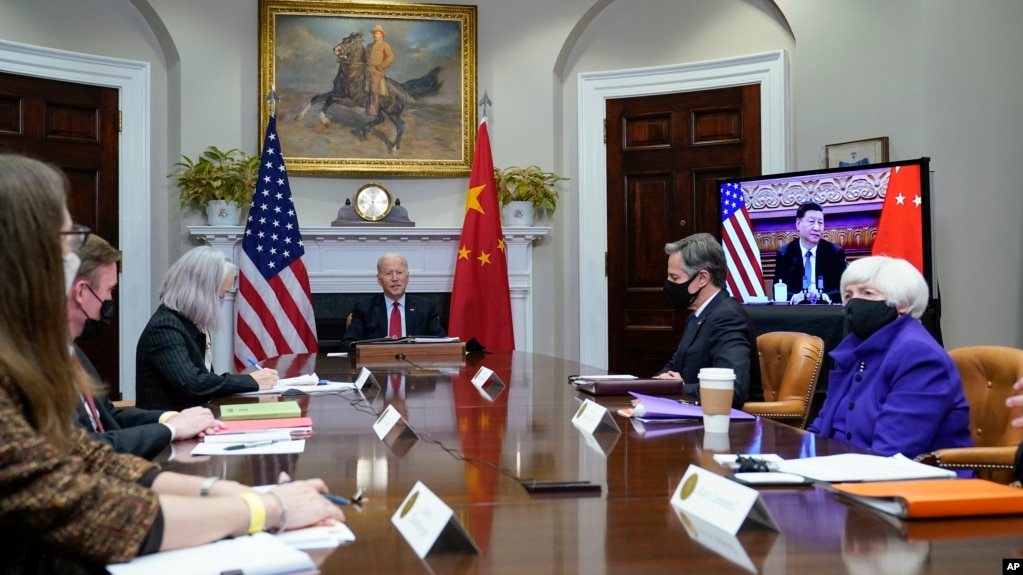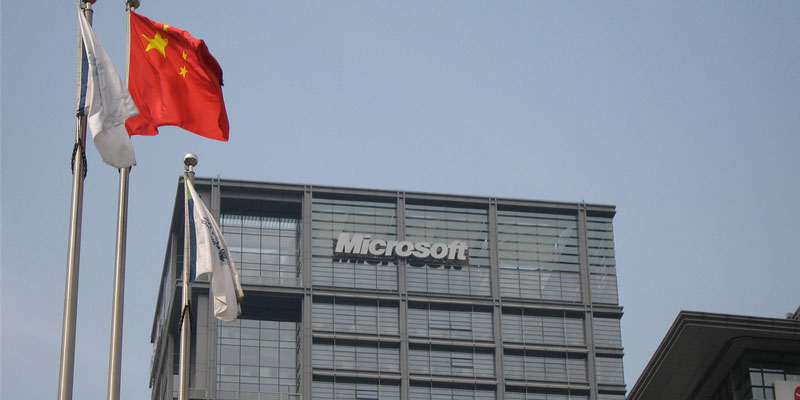It does not begin and end with zero consequence of China for all things pandemic….it is much much worse. Consider all the items below and then apply critical thinking on why America is so subservient to the Chinese Communist Party.
The list is hardly complete but here is a good start:
- Dr. Fauci –>Source: Adam Hott, who works on the National Institutes of Health (NIH) Clinical Sequencing Evidence-Generating Research group, is also affiliated with the United States Heartland China Association (USHCA). He serves on the controversial group’s education committee, which seeks to “brings together resources in K12 and higher education to apply research, expertise, and new entrants to the workforce to US-China collaboration.”
The unearthing of the United States Heartland China Association (USHCA) ties to Chinese foreign influence groups follow reports of Chinese Communist Party members and firms buying up American farmland, raising national security concerns among lawmakers.
In addition to partnering with various branches of the Chinese regime, the USHCA also is “proudly working with” the China-United States Exchange Foundation (CUSEF).
The organization is an integral component of the Chinese Communist Party’s “United Front,” an effort that seeks to “co-opt and neutralize sources of potential opposition to the policies and authority of its ruling Chinese Communist Party” and “influence foreign governments to take actions or adopt positions supportive of Beijing’s preferred policies,” according to the U.S. government.
- Then there is Hunter Biden and the whole Biden family.Source: A grand jury subpoena was issued 17 months before the 2020 election for Hunter Biden’s bank transactions involving the Bank of China, a corruption watchdog has found, raising concerns that damaging material about then-candidate Joe Biden was hidden from voters.
The order sent by the Department of Justice to JP Morgan Chase bank asked for the records of any international financial transactions for the past five years involving Hunter, his uncle James Biden and former business partners Devon Archer and Eric Schwerin, according to federal documents.
The anti-corruption nonprofit Marco Polo, founded by former Trump administration official Garrett Ziegler, obtained the filing, which targets the financial ties between the four men and the Bank of China.
The subpoena was issued by Delaware’s US Attorney David Weiss on May 15, 2019. At the time, Hunter’s father, Joe Biden, was a presidential candidate.
 . source
. source- Perhaps the worst of it all –> and it is a long one…sit back and process as you read it. Source: A new, comprehensive report by the Victims of Communism Memorial Foundation, titled “Corporate Complicity Scorecard,” reveals what these companies have traded away and how much their Faustian bargain with the CCP has endangered all of us.The report, produced jointly by VOC and Horizon Advisory, evaluates eight well-known American corporations — Amazon, Apple, Dell, Facebook, GE, Google, Intel, and Microsoft. It presents “broad-ranging assessments of the nature of American corporations’ involvement in China” based on a set of indicators, including compliance with Chinese data regimes and supply chain exposure to forced labor risk. The report assigns a letter grade between A to F to the companies, with Facebook and Google receiving the highest score of “B,” while GE, Intel, and Microsoft got the lowest score of “F.”
According to the VOC report, these American companies’ complicity endangers everyone else for several reasons. It exposes U.S. industrial supply chains to China’s forced labor and other human rights atrocities. It empowers a strategic competitor while hollowing out U.S. industrial capacity. It also makes U.S. industry a conduit for the Chinese government’s vast information collection (i.e., surveillance programs). Lastly, it makes U.S. industry a channel for Chinese influence and propaganda abroad.
All eight companies’ complicity is also endangering their long-term survival because through the “Made in China 2025” initiative, the Chinese government has been developing domestic competitors, intending to become “self-reliant” in strategically essential technologies. Shockingly, these American companies seem to fail to recognize that their technology transfers and billions of dollar investment in China will end up creating their own eventual replacements in this market.
Furthermore, some of these companies have engaged “in political lobbying in the U.S. in ways that ultimately serves Beijing’s interests while potentially undermining the values and principles that undergird the western democratic order.”
Intel Gets an ‘F’
Intel sent a letter earlier this year to suppliers advising them not to source from Xinjiang, without mentioning either forced labor or genocide committed by the CCP against Uyghur Muslims and other minorities in the region. Still, the company promptly apologized to China after its letter drew backlash from state media and Chinese nationalists.
The VOC report provides insights into Intel’s engagement in China. The company has a prominent presence in the country, including 17 campuses, at least two production sites, and “a series of innovation and R&D centers across China.” The company has built extensive ties to Chinese government agencies. For instance, the company has partnered with the Chinese Academy of Sciences Institute of Automation (CASIA), a “core contributor to China’s military and military-civil fusion programs.”
Intel also collaborated with China’s Ministry of Industry and Information (MIIT), a “leading state entity charged with implementing China’s military-civil fusion national strategy.” The report finds “Intel executives continue to engage with MIIT representatives in fields relevant to military-civil fusion, even as tensions between the US government and China escalate and risks posed by Beijing’s military-civil fusion strategy become more evident.”
Intel’s partnership with Chinese companies is also problematic. The company is a long-time major supplier to Hikvision, a Chinese state-owned manufacturer and supplier of surveillance equipment. The two companies launched a comprehensive partnership in artificial intelligence in 2017.
After the Trump administration added Hikvision to the U.S. Department of Commerce’s Entity List and barred it from buying restricted components from the United States in 2019, former Intel Chief Executive Officer Bob Swan reportedly vowed to use “Intel’s global operating capabilities to reduce the impact on customers.” Later that year, several U.S. technology firms, including Intel and Microsoft, issued a joint statement “calling for then-President Trump not to impose tariffs on Chinese laptops and tablets.”
The VOC report also finds that “Intel technology was being used in surveillance systems in Xinjiang” and “Intel had invested in and provided technologies to a company embedded in Xinjiang and supported by the Chinese Ministry of Public Security.” Intel essentially plays a critical role in enabling the Chinese government to build a digital prison in Xinjiang and monitor every move by millions of Uyghur Muslims.
Microsoft Also Gets an ‘F’
Microsoft also received a grade of “F.” The VOC report finds that “Microsoft has a significant, and growing, network of innovation centers, data centers, joint laboratories, and other technology hubs in China. Many of these have been established in partnership with the Chinese government or government-tied entities.”
For example, Microsoft has built at least 10 data centers in China, all operated by a local Chinese partner, 21Vianet. In compliance with China’s data security laws, all data collected at these centers are accessible to the Chinese government.
Microsoft has also partnered with Chinese companies to tailor its products to meet the Chinese government’s needs. A 2021 report from Top10VPN found that many Chinese government surveillance and censorship organs “use Windows products in their security and surveillance systems.”
Like Intel, Microsoft has established strategic cooperation agreements with Chinese companies that “the US government has identified as tied to the Chinese military or as an export restriction concern.” For example, one of Microsoft’s strategic partners is Dajing Innovations (DJI), a leader in civilian drones and imaging technology. The Trump administration put DJI on the Department of Commerce’s sanctioned Entity List in 2020. Microsoft has yet to sever its business ties with DJI.
At least three Chinese suppliers of Microsoft were found to involve forced labor in Xinjiang. However, Microsoft has maintained business relationships with these suppliers. In addition, the company continues to invest in R&D in China “even as tensions between the US and China escalate—and Beijing’s technological ambitions have become broadly recognized as posing risks for global human rights and security.”
Why GE Received an ‘F’
GE is the third company that receives an “F.” Similar to Intel and Microsoft, GE’s many partnerships in China “appear to involve technology-sharing, including with core players in China’s military, military-civil fusion, and surveillance system. Those partnerships have also granted military-tied Chinese players positions of leverage in GE’s supply chains, critical to both America’s national security and its manufacturing base.”
Since GE is also a key contractor for the U.S. Department of Defense, these partnerships and technology-sharing agreements are especially troubling.
Losing Strategy
The VOC report gave the other five companies slightly better scores than “F.” But make no mistake, all of these companies have similarly “supported Beijing’s military modernization, the surveillance state, and human rights violations in exchange for access to China’s market.”
As the great power competition between the U.S. and China intensifies, corporations cannot pretend this is business as usual. Whether they like it or not, corporations are increasingly at the center of the Sino-U.S. geopolitical conflict. These American companies should never forget what made them successful in the first place.
In the words of former Attorney General William Barr, American companies are beneficiaries of “the American free enterprise system, the rule of law, and the security afforded by America’s economic, technological, and military strength.” China’s authoritarian regime is not a “hospitable one for institutions that depend on free markets, free trade, or the free exchange of ideas,” Barr said.
The VOC scorecard reminds these American companies that acquiescing to Beijing is a lose-lose strategy and will endanger all of us in the long run.
 Back in 2007, Bill Gates told Fortune that he expected China to be Microsoft’s biggest market, “though it might take 10 years.”. Those comments were made during a visit to Beijing when Gates was awarded an honorary degree from Tsinghua University and met with four members of China’s ruling Politburo. More detail
Back in 2007, Bill Gates told Fortune that he expected China to be Microsoft’s biggest market, “though it might take 10 years.”. Those comments were made during a visit to Beijing when Gates was awarded an honorary degree from Tsinghua University and met with four members of China’s ruling Politburo. More detail




